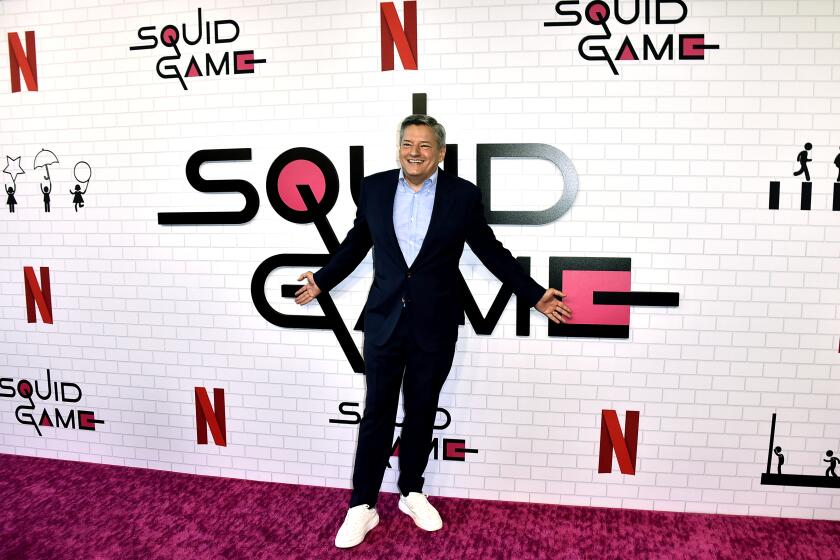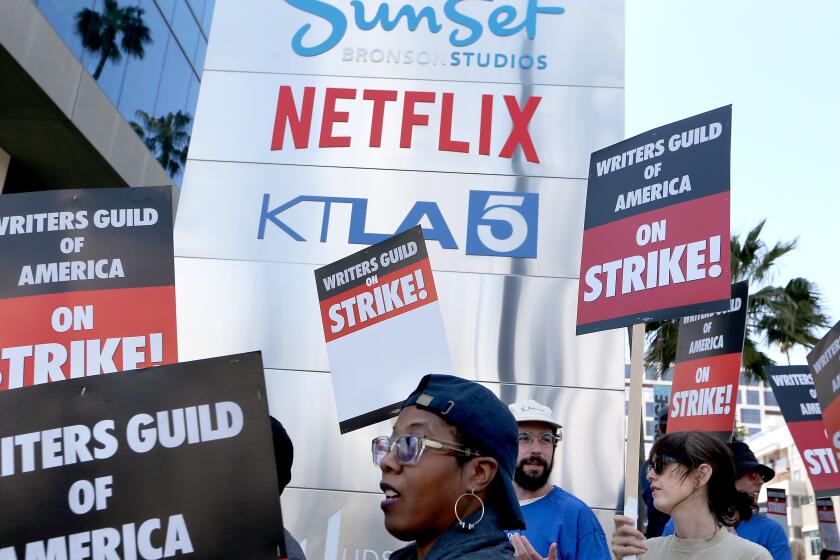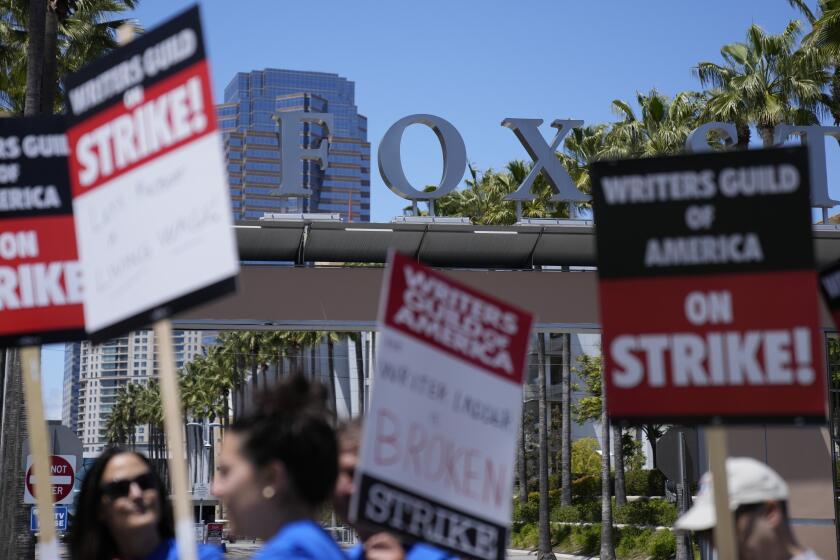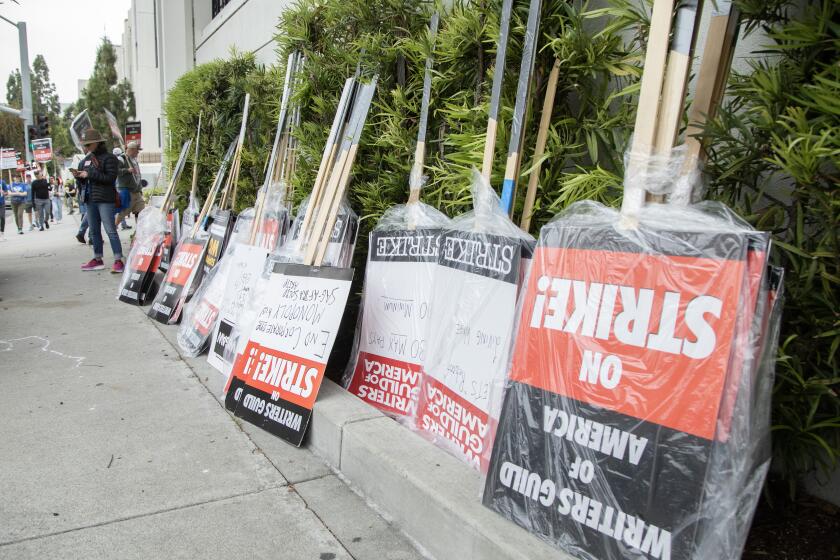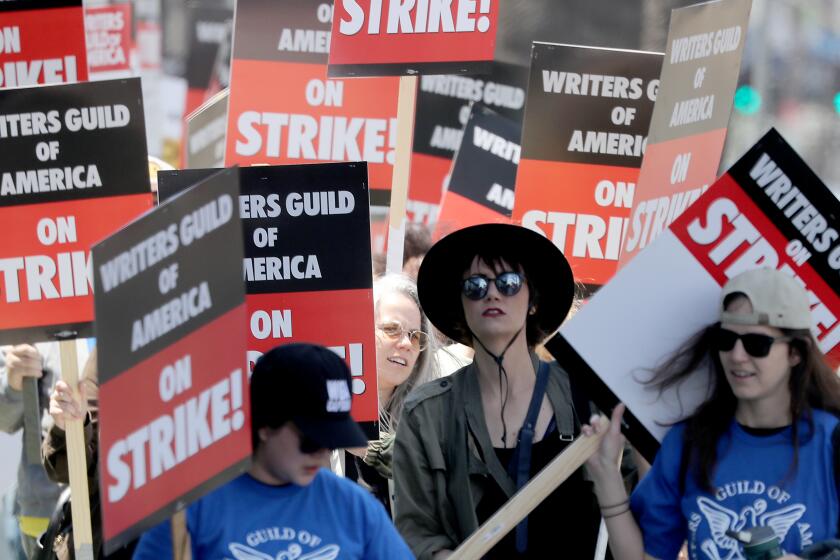Column: Is it time to boycott Netflix? How streaming consumers could shape the strike
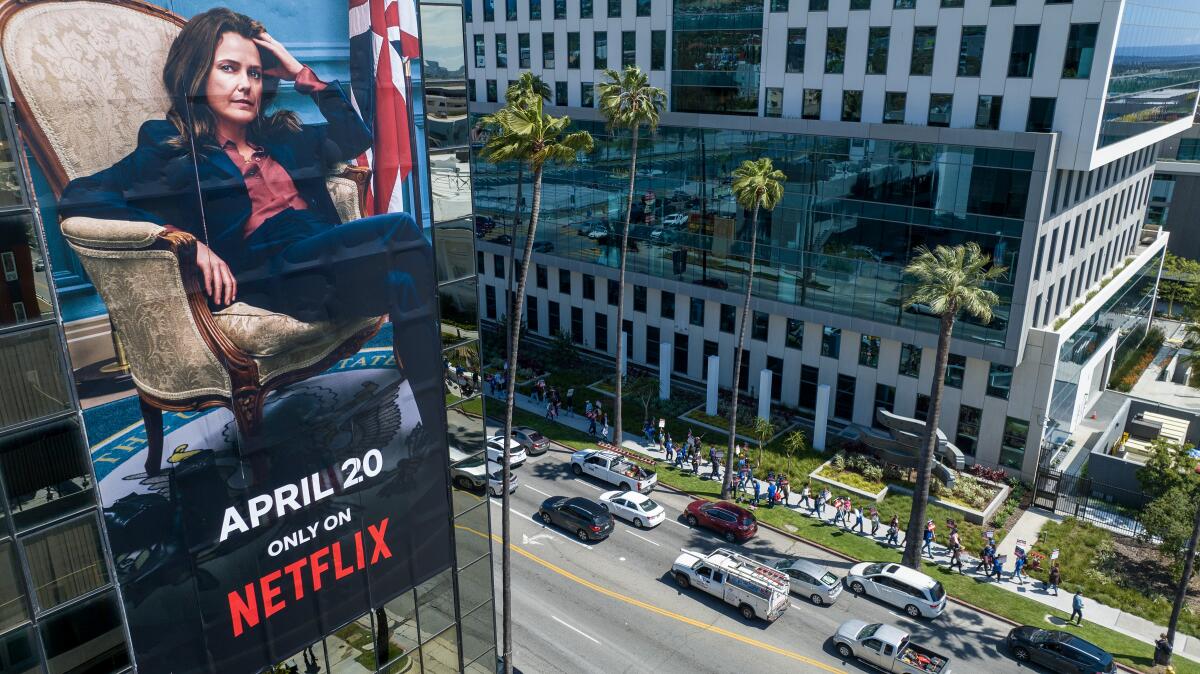
As the writers’ strike stampedes through its second month and the possibility of an actors’ strike looms, it’s time to ask: When — and how — should consumers get involved?
Should we, say, consider canceling our subscriptions to Netflix, Amazon, Hulu, Disney+, Apple TV+, Max or any of the many other streaming services vying for our eyeballs and dollars until the strike is resolved?
Would that be helpful? Or, in this streaming-addicted culture, is it even possible?
Many cord-cutters are already unhappy with what was supposed to be an economical alternative to pricey cable bundles. With complicated multiplatform deals and studios clawing back content for their own streamers, keeping track of what series lives where has become a full-time job. And even as originators like Netflix lose popular content, every year brings a price increase.
Now the streamers have forced at least one strike, and possibly another, that will have a harmful long-term impact not just on the entertainment industry but on the economies of any city in which television is made.
Including and especially Los Angeles.
In the days before the Writers Guild of America called on members to strike, the creators of hit shows, including ‘Shrinking,’ ‘The Last of Us’ and more, gathered to discuss the state of the industry.
Streaming platforms are not the only studios represented by the Alliance of Motion Picture and Television Producers, but the writers’ work stoppage has become known at the Netflix strike — and for good reason: Most of the WGA’s demands, and many of SAG-AFTRA’s concerns, involve the business model of original-content streaming platforms, in which shorter seasons and an absence of traditional residuals have left many writers and actors struggling to make a living.
Writers are also challenging the streamer-led model of “mini-rooms,” in which a small number of writers are hired to break a series, a larger number are hired to write it and then almost all but the showrunner are let go before the series is actually made. Not only does this eliminate staff positions, forcing many into perpetual freelance mode, it puts a huge burden on showrunners while making it impossible for young or less experienced writers to learn how television is made.
This can only lead to a decreasing pool of writers prepared to become showrunners, which makes the system not only unjust but unsustainable.
Both guilds are pushing back on other issues — namely the use of AI — but most of their sticking points boil down to the fact that streaming platforms broke the traditional business model of television, and now they must at least attempt to fix it.
First by ensuring that the people who write what streamers sell are paid a fair and livable wage.
The demands made by the WGA and SAG-AFTRA are a surprise to absolutely no one. In past negotiations over digital rights, the studios claimed ignorance; now they claim poverty.
Streamers don’t make money in large part because, until recently, they presented content with no advertising.
Which was, of course, one of their biggest selling points.
There is a shameful pleasure in seeing Netflix humbled, but no one wants a free fall for the only streamer focused on one product: creative content.
It’s difficult to understand how exactly Netflix and its ilk hoped to make money. The only reason television (or most media) exists is because of advertising. There may be subscription fees, but it’s ads that pay the bills. Sure, when Netflix began gobbling up shows from network libraries and offering consumers a world of television at their fingertips with no distracting ads, it seemed like the Eighth Wonder of the Modern World. But when “House of Cards” announced Netflix’s entrance into the business of original scripted television — well, that’s when things got sticky. Streamers want the kind of content that will draw audiences away from those cable bundles, but, as it turns out, they don’t want to pay for it.
What seemed like a boon for writers and actors — so many new series! — was soon revealed as a con. Yes, there was more television being made than ever before, but it was being made in a way that made the professional lives of writers and actors — even those on wildly successful series — more precarious, not less.
No one, aside from the streamers themselves, knows what makes a successful series on streaming. Which is very convenient if you want to avoid paying any sort of residual.
None of this happened suddenly; the AMPTP has had years to figure out a contract that would address the issues and avert any kind of strike.
Years.
Instead, they have chosen to appear shocked — shocked to find that the writers in particular have so many demands. Instead, they have decided to wring every cent they can from unfair compensation systems, and now to precipitate a strike during which no one is getting paid.
But it isn’t just the writers who lose income when production shuts down. It’s the crew, the costume and prop houses, the security guards, the caterers, the restaurants, the florists, the hotels, the trailer rental companies, the cafes — a cascade of loss from businesses that depend on healthy amounts of television and film production.
And the studios knew this as well.
Why many members of the Writers Guild of America have targeted streaming giant Netflix in their fight for higher streaming residuals.
The 2007-08 writers’ strike cost California 38,000 jobs and more than $2 billion. Since then, television production has spread at a remarkable rate across the country — Georgia’s Little Hollywood is also suffering, as are the many cities that have built thriving production economies.
Because striking writers, and potentially actors, cannot do publicity, Netflix, Disney, HBO, Sony and other studios have decided to skip this year’s Comic-Con in San Diego, which will take a huge toll on an event and a city only just recovering from the pandemic.
The prospect of so many summer films being forced to open without actors on publicity appearances may spur the AMPTP to offer SAG-AFTRA an acceptable deal, but that does not mean the writers, who have more and separate demands, will get the same.
So at what point can — and should — the consumers step in?
The WGA has not called for a boycott of streamers: Unlike, say, refusing to buy grapes or turning off the TV for a week, unsubscribing from a streamer is a longer-term decision — and every writer wants their show to be watched.
But Netflix and other streamers might want to consider the power of consumers, especially in Los Angeles and other areas that will continue to be economically wounded should the actors decide to strike or the writers’ strike continue through the summer.
As beneficiaries of the streaming invasion, consumers may want to consider their responsibilities — to those who wrote their favorite shows, but also to all the cities now detrimentally affected by the work stoppage.
The writers’ strike, if it stretches on, could deliver a massive blow to the economy in Southern California. One expert predicted $3 billion or more in losses.
The writers’ strike has already touched millions of people who have no control over the negotiations. Although the studios were able to prepare by stockpiling scripts and leaning on non-WGA content, that kind of cushion is not available to the thousands of industry professionals now out of work. Or to all the ancillary businesses adversely affected by a widespread halt in production.
A streaming boycott is probably not the answer. It’s difficult to imagine a significant number of people giving up Netflix, Apple TV+, or any of their favorite streamers. Failing platforms help no one.
Still, a Netflix strike is not a good look, and as the streamers are already concerned about financials, they should move quickly to reach an agreement with the guilds. If not, well, how surprising would it be if some people, concerned about the local economy, begin to think that the money spent on streaming services isn’t worth it in the middle of a strike that those streaming services caused?
Not surprising at all.
More to Read
The biggest entertainment stories
Get our big stories about Hollywood, film, television, music, arts, culture and more right in your inbox as soon as they publish.
You may occasionally receive promotional content from the Los Angeles Times.

